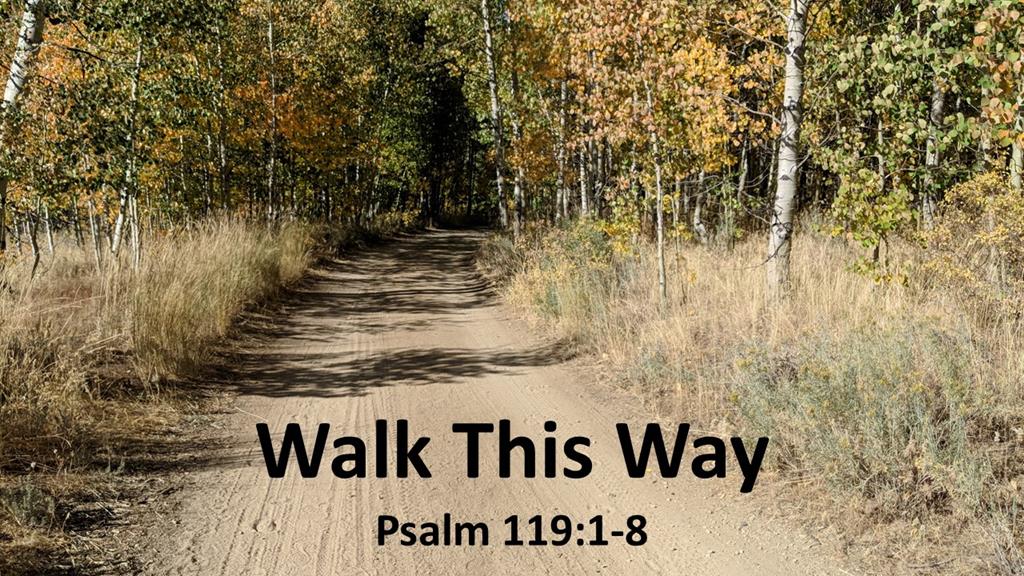 Jeff Garrison
Jeff Garrison
Skidaway Island Presbyterian Church
Psalm 119:1-8
February 16, 2020
We’re back looking at ways for us not to be so SAD. How can we overcome bouts of Spiritual Affective Disease? How can we get closer to our Creator? This series offers us ways, beyond the usual Bible study and prayer, that we can reconnect with God. So far, we’ve looked at meditation, music, laughter, serving others, and appreciating God’s presence all around us.
 Today, we’re looking at walking. In a way, the ability to walk is what makes us human. In Genesis, we have that beautiful image of God walking in the garden and wanting the man and woman to join the stroll.[1] According to Bruce Chatwin, in the Middle Ages it was thought that by going on a pilgrimage (which meant walking), you were recreating that original condition of humanity. Walking through the wilderness brought you back to God.[2] As humans, we are designed to move which allows us to experience God’s world, to connect with God’s people, and to come closer to God.
Today, we’re looking at walking. In a way, the ability to walk is what makes us human. In Genesis, we have that beautiful image of God walking in the garden and wanting the man and woman to join the stroll.[1] According to Bruce Chatwin, in the Middle Ages it was thought that by going on a pilgrimage (which meant walking), you were recreating that original condition of humanity. Walking through the wilderness brought you back to God.[2] As humans, we are designed to move which allows us to experience God’s world, to connect with God’s people, and to come closer to God.
Our two scripture passages from the Psalms this morning have to do with walking. Our third passage, which we heard earlier from the Gospel of Luke, about following a path set forth by God, is about a metaphorical walk. As we journey through life, we need to follow God’s path and use the legs God’s given us to connect with one another and with God. And even if we can’t get up and walk, we can use our bodies in whatever way we can, to move and to delight in God’s creation.
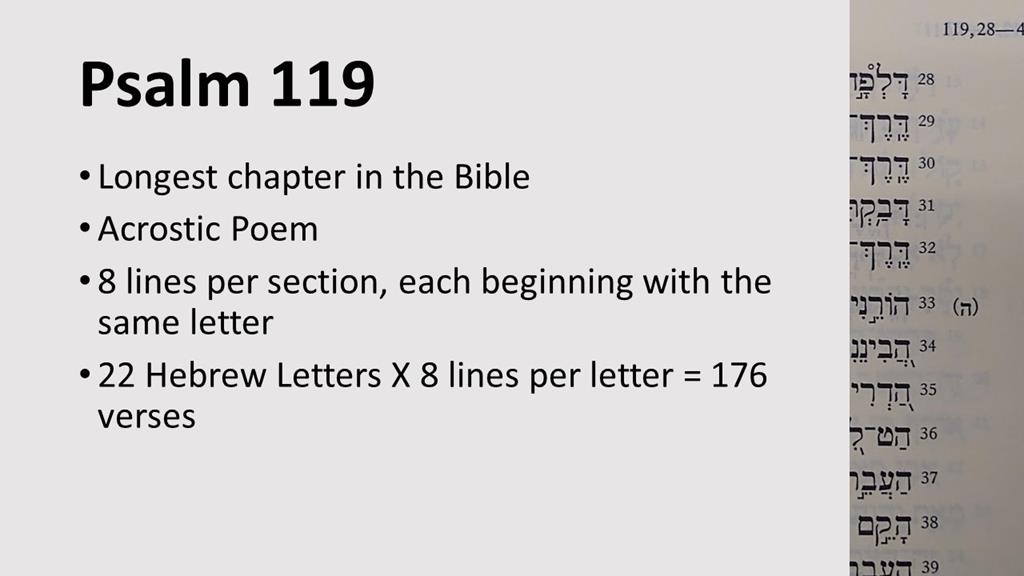 Before reading our last passage, from Psalm 119, let me share a bit about this mega-Psalm. You might know that this Psalm is the longest chapter in the Bible. There are 176 verses to the 119th Psalm. It’s way too much to preach on in one sermon! But it’s also a unique. I know you’ve heard me speak of acrostic Psalms… This is a type of poetry where every line begins with the next letter in the alphabet. In English, it would be like writing, “Apples are red, Berries are blue, Cats are cute… etc. Using an acrostic method helps in memorization. I’ll come back to this later in the sermon.
Before reading our last passage, from Psalm 119, let me share a bit about this mega-Psalm. You might know that this Psalm is the longest chapter in the Bible. There are 176 verses to the 119th Psalm. It’s way too much to preach on in one sermon! But it’s also a unique. I know you’ve heard me speak of acrostic Psalms… This is a type of poetry where every line begins with the next letter in the alphabet. In English, it would be like writing, “Apples are red, Berries are blue, Cats are cute… etc. Using an acrostic method helps in memorization. I’ll come back to this later in the sermon.
Psalm 119 is an acrostic poem on steroids. Each letter in the Hebrew alphabet receives eight lines, and each of those lines starts with a word with the same letter.[3] Unfortunately, this doesn’t translate well across languages. Since Hebrew has 22 letters, you multiply that by 8, and you get our 176 verses! Be thankful I’m not reading them all!
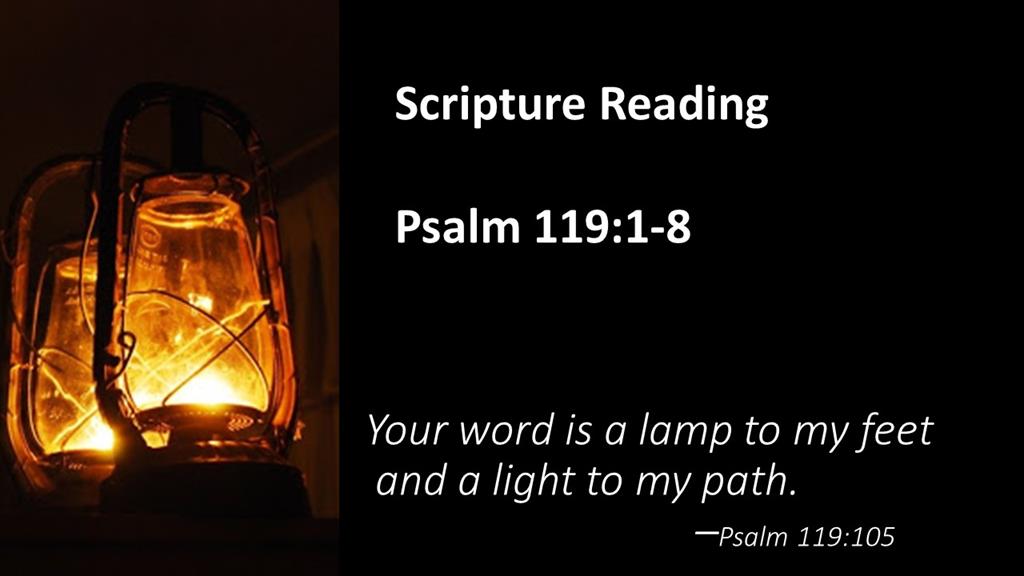
The late Kurt Vonnegut once informed his wife that he was going out to buy an envelope. This was what ensued:
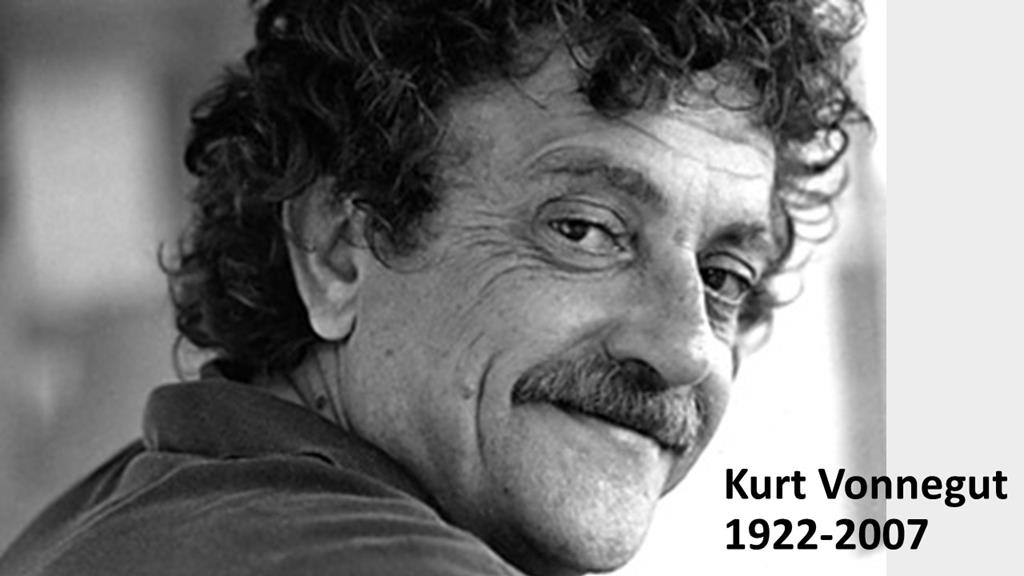
“Oh, she says, well, you’re not a poor man. You know, why don’t you go online and buy a hundred envelopes and put them in the closet? And so I pretend not to hear her. And go out to get an envelope because I’m going to have a heck of a good time in the process of buying one envelope. I meet a lot of people. And see some great-looking babies. And a fire engine goes by. And I give them the thumbs up. And I’ll ask a woman what kind of dog that is. And, and I don’t know. The moral of the story is – we’re here on Earth to play around. And, of course, the computers will do us out of that. And what the computer people don’t realize, or they don’t care, is we’re dancing animals. You know, we love to move around. And it’s like we’re not supposed to dance at all anymore.”[4]
It’s very easy today for us all to become couch potatoes, but that’s not why we’re created in this fashion and with these bodies. If these bodies are still working, we need to use them, even if they don’t work as well as they did when we were younger!
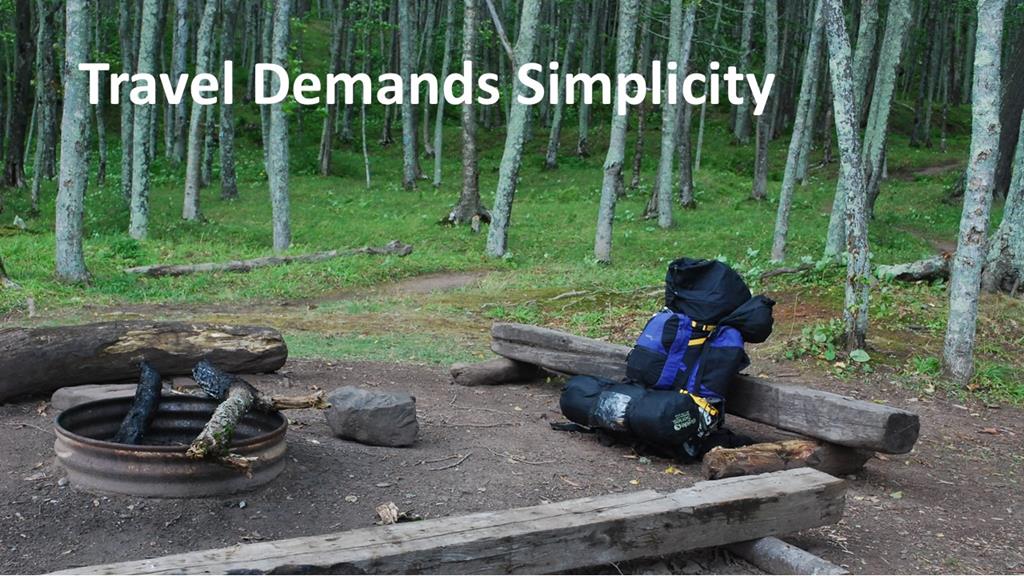
“Travel by its very nature demands simplicity,” Rolf Potts proclaims in his book, Vagabonding.[5] This is even more so when walking, as one is limited to what one can carry. Walking simplifies things further by slowing us down and forcing us to look around. After all, we want don’t want to trip on a crack in the sidewalk or step in a mud puddle. As we start looking around, we become more aware and notice more about what’s happening. We appreciate the flowers that throw off a scent in the spring. Don’t you love it when the oleander and jasmine are in bloom? We can stop and meet our neighbors. Or perhaps we might catch a neighborhood battle that we’d missed as we speed along on asphalt in a car with the windows up.
Have you ever seen an eviction? It’s something to behold. You wouldn’t want to miss it, would you? Now that I have your attention, let me tell about a walk I took a few months before moving from Michigan.

I was walking down Green Street in the early spring and heard all this commotion in the maple trees that lined the road. It was in the evening. Looking up, I saw an owl sitting in top of the trees. The feathery neighborhood association, all of which had eggs or babies in those trees, weren’t too happy. They knew what that owl was up to no good. A dozen or so birds, of all varieties, worked together to encouraged the owl to move on. One would fly close by and as the owl followed it, another bird would come in on its blind side and peck the owl on its head. I stood and watched for a good twenty minutes, until finally the owl had enough and moved to another tree. Think of all we miss as we huddle inside our climate-controlled homes and cars.
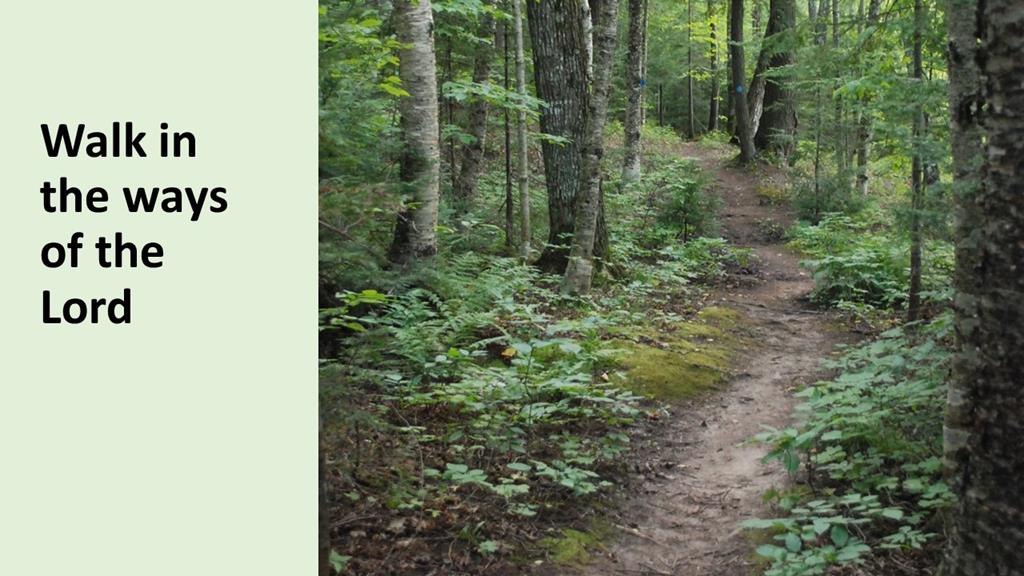 Of course, we’re not just to walk for walking sake, even though it is good for our physical being. Scripture tells us repeatedly to walk in the ways of the Lord. Psalm 119 is a meditation on God’s law. Throughout this passage, we’re encouraged to walk in the law, to walk in the ways of God, to let God’s law light the path for our feet.
Of course, we’re not just to walk for walking sake, even though it is good for our physical being. Scripture tells us repeatedly to walk in the ways of the Lord. Psalm 119 is a meditation on God’s law. Throughout this passage, we’re encouraged to walk in the law, to walk in the ways of God, to let God’s law light the path for our feet.
This Psalm opening section, which I read this morning, speaks of how those who walk in God’s ways are blessed. And so are we, if we do our walking with God at our side, using our time out when alone or with others, to be delighted in God’s creation and to appreciate God’s providence. You see, walking can benefit us, spiritually and physically. When we move, we can connect with others and with God. So, this week, ponder this passage as you take time each day to take a walk. Let’s get moving and enjoying where we live.
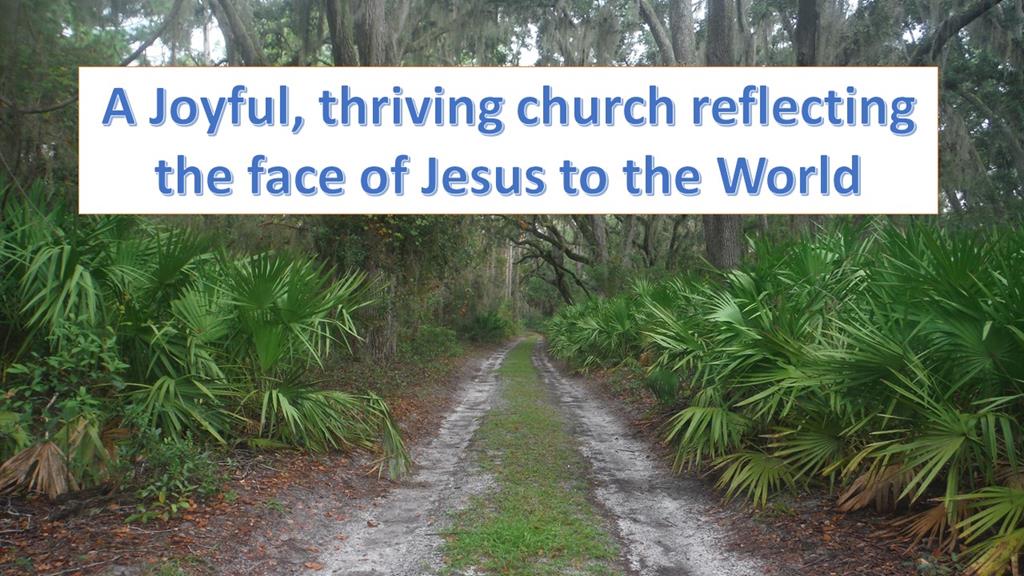 But I also want you to join in on another walk, one that will involve all the congregation. As you know, next Sunday we’re going to lay out a new Strategic Plan for our congregation. We want to be a “joyful, thriving church reflecting the face of Jesus to the world!” Our mission is to “Love God, Love our Neighbors, and to Change the world.” We have set up core values (using an acrostic formation-kind of like Psalm 119-that spells out WORSHIP). These core values demonstrate God’s love by Welcoming, Offering, Respecting, Serving, Helping, Investing, and Praying. All this is supported by four pillars, which we as a church need to walk within. These pillars will require each of us to commit ourselves to excellence, and we if bind ourselves on this journey together, we will live into our Vision and Mission.
But I also want you to join in on another walk, one that will involve all the congregation. As you know, next Sunday we’re going to lay out a new Strategic Plan for our congregation. We want to be a “joyful, thriving church reflecting the face of Jesus to the world!” Our mission is to “Love God, Love our Neighbors, and to Change the world.” We have set up core values (using an acrostic formation-kind of like Psalm 119-that spells out WORSHIP). These core values demonstrate God’s love by Welcoming, Offering, Respecting, Serving, Helping, Investing, and Praying. All this is supported by four pillars, which we as a church need to walk within. These pillars will require each of us to commit ourselves to excellence, and we if bind ourselves on this journey together, we will live into our Vision and Mission.
What are these pillars?
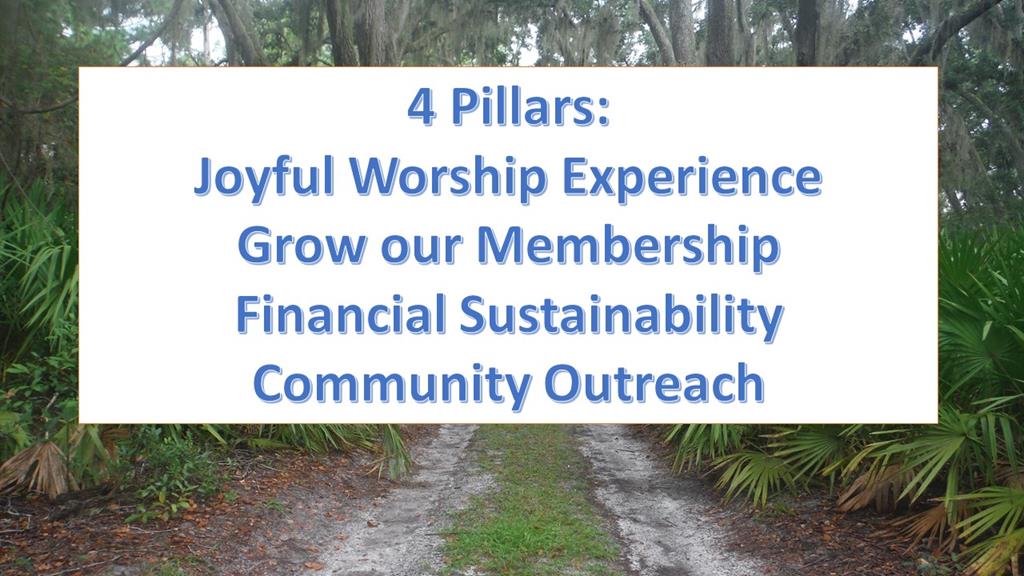
- A joyful worship experience.
- Grow our membership.
- Improve our financial sustainability.
- And increase our community outreach.
In each of these four areas, there are ways for you to walk with your friends here at Skidaway Island Presbyterian Church.
We’re all needed in worship, to lift our praises to God and to focus, first and foremost, on the Lord. Also, we need those of you who have special talents to help with music, with drama, in the sound booth, or with the liturgy. As we continue to work on creative worship, we’ll need to draw on everyone’s creativity.
To grow our membership, we need you to invite friends and family members to experience our church. And once someone visits, they need to see what a caring family we are. We need to love one another in a way that will make others want to be a part of our family.
To improve our financial sustainability requires us to look forward to the future. Past generations built and paid for this wonderful facility. Those of us who came here later received it as a gift. As we move forward, we need to sustain our ministries in a way that finances won’t be such a burden. We need to build endowments and to encourage everyone to be generous as God has been generous to us. What kind of gift can we give to those who follow us?
And finally, we need to increase our outreach into the community. We’ve been doing this with Civility Forums (the next one is March 4th), with the Calvin January Series, and with the very popular sunrise service. What other ways can we reach out and provide a home for those in our community who want to come and to learn and to be a part of changing the world?
It’s time for a long walk. Will you join us? Be here next week for the town hall meeting and between then and now, take a walk or two and ponder what you can do to further the gospel in the world. Amen.
©2020
A note about the photos. All but the photo of the owl (which came from Pixabay.com) and the one of Kurt Vonnegut are mine. The first one of a two-rack road was taken in Spooner Summit in Nevada (on the west ridge over Lake Tahoe). The lantern was my grandfather’s. The next images were taken on a backpacking trip in the Porcupine Mountains of Michigan. The last photo of a two-track road was taken on Cumberland Island, Georgia.
[1] Genesis 3:8-9.
[2] Bruce Chatwin, Songlines as quoted by Phil Cousineau, The Art of Pilgrimage: The Seeker’s Guide to Making Travel Sacred (New York, MJF Books, 1998), 18.
[3] This is easily seen by looking at a Hebrew text. For more information see James L. Mays, Psalms: Interpretation: A Biblical Commentary for Teaching and Preaching (Louisville, JKP, 1994), 381-382.
[4] I am not sure where this came from. I read it a month ago, cut and pasted it and saved it without providing the source. When I looked on the internet, I realized it’s been a quoted a lot over the last 15 years… I cleaned up the text a little for the sermon, replacing hell with heck and play for fart.
[5] Rolf Potts, Vagabonding (New York: Villard, 2003), 32.

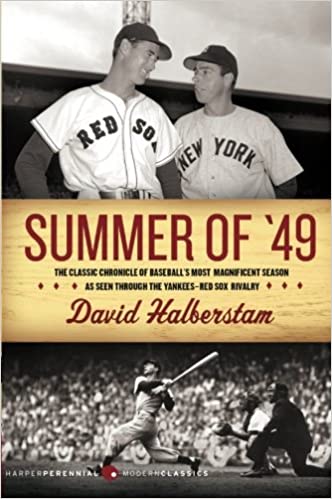 David Halberstam, Summer of ‘49, (1989, New York: HarperPerennial, 2002), 354 pages, with a bibliography, index, and some black and white photographs.
David Halberstam, Summer of ‘49, (1989, New York: HarperPerennial, 2002), 354 pages, with a bibliography, index, and some black and white photographs.
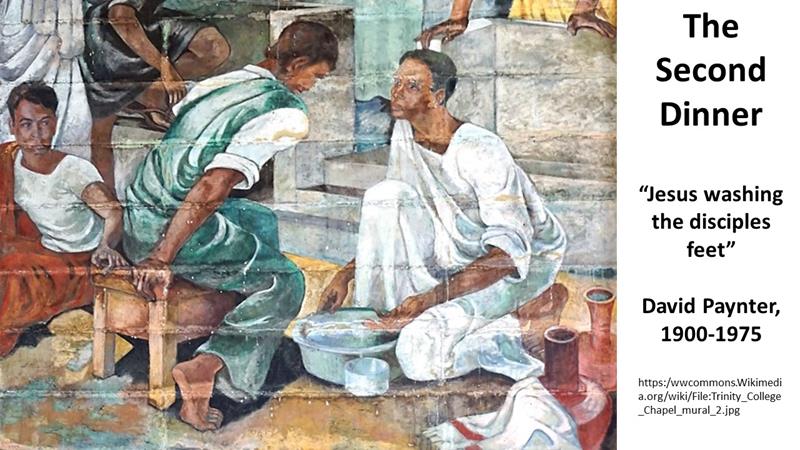 Jeff Garrison
Jeff Garrison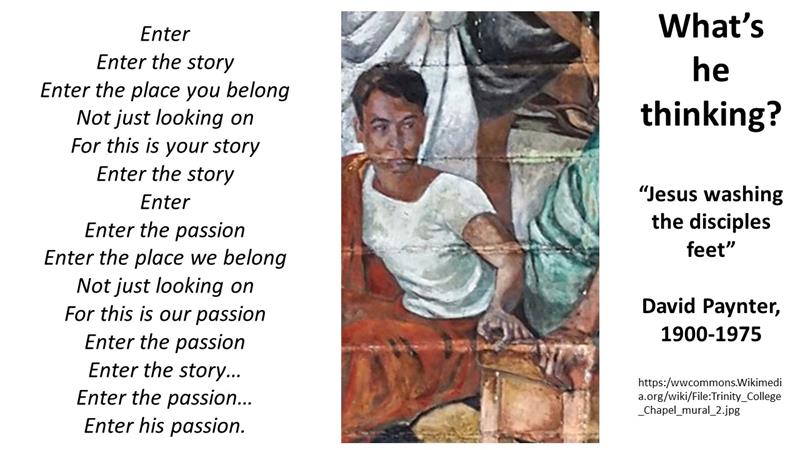 Jesus and the disciples have booked my master’s banquet hall. I have prepared everything according to their wishes and am ready with the water and basin as I always am. Years ago, my parents gave me to the owner as collateral for the debt they owed. But things did not go well for them, and the debt was never repaid. And so, I work to pay it off. Roman law says that someday I could be a freed person, but I will never again have the full rights in society. I’m marked as a slave for life. I keep my head down and do what the master asks because legally he has the right to punish me.
Jesus and the disciples have booked my master’s banquet hall. I have prepared everything according to their wishes and am ready with the water and basin as I always am. Years ago, my parents gave me to the owner as collateral for the debt they owed. But things did not go well for them, and the debt was never repaid. And so, I work to pay it off. Roman law says that someday I could be a freed person, but I will never again have the full rights in society. I’m marked as a slave for life. I keep my head down and do what the master asks because legally he has the right to punish me. 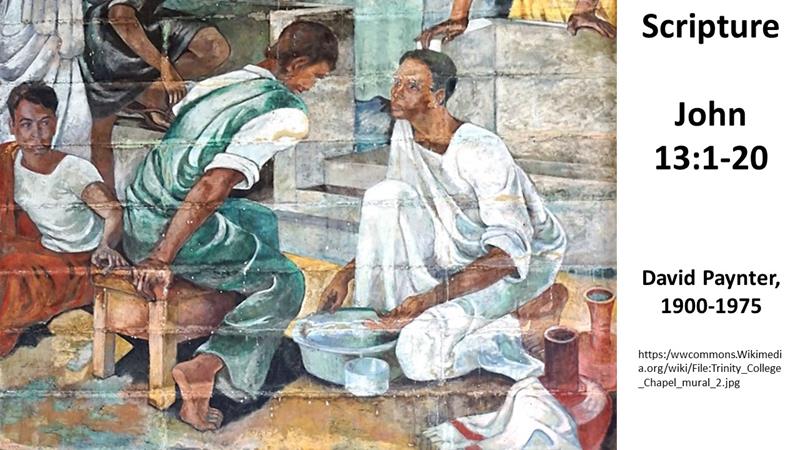
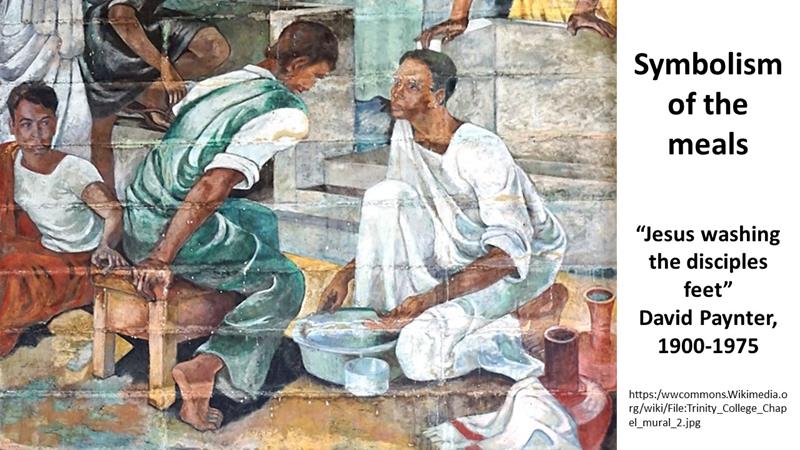 Last week we explored the first meal recorded during Jesus’ final week of earthly ministry. This is the dinner in Simon’s home interrupted by the woman with perfume anointing Jesus. Today, we’re looking at the second meal of this week. Of course, there weren’t just two meals eaten during these seven days. These are just the two recalled in the gospels. Both meals are rich with symbols. Last week, we could almost smell the expensive perfume being poured. This week, we have the bread and the wine, the foot washing, and the betrayal, all mixed in. We know this dinner as the “Last Supper” and there’s enough material here for two dozen sermons. I promise I won’t exhaust the passage.
Last week we explored the first meal recorded during Jesus’ final week of earthly ministry. This is the dinner in Simon’s home interrupted by the woman with perfume anointing Jesus. Today, we’re looking at the second meal of this week. Of course, there weren’t just two meals eaten during these seven days. These are just the two recalled in the gospels. Both meals are rich with symbols. Last week, we could almost smell the expensive perfume being poured. This week, we have the bread and the wine, the foot washing, and the betrayal, all mixed in. We know this dinner as the “Last Supper” and there’s enough material here for two dozen sermons. I promise I won’t exhaust the passage.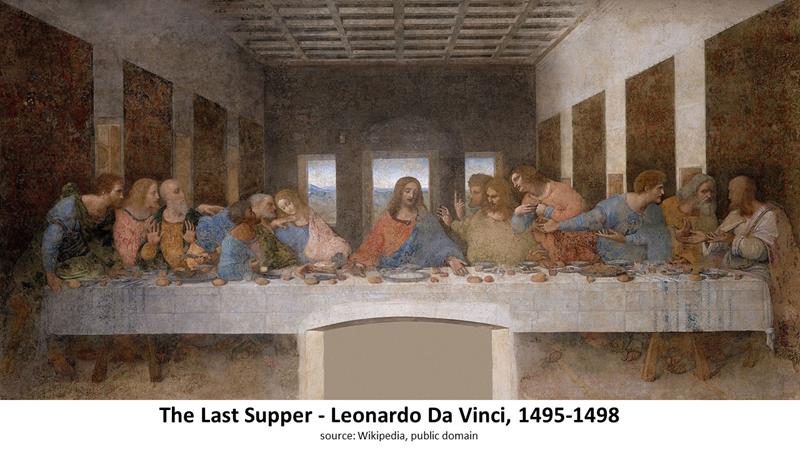
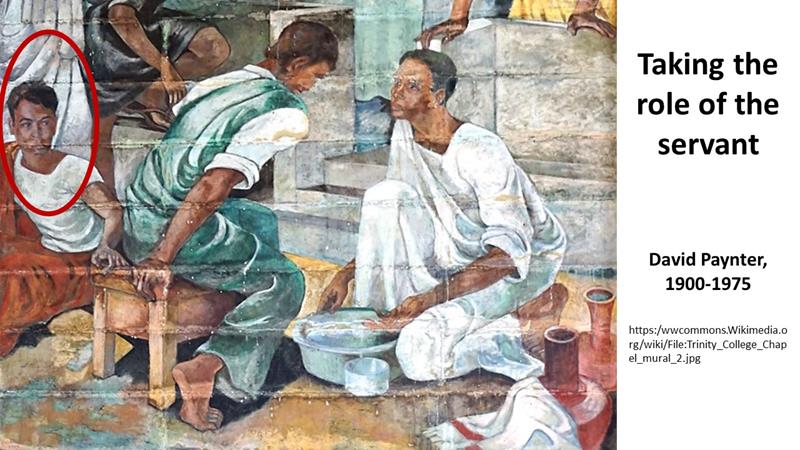
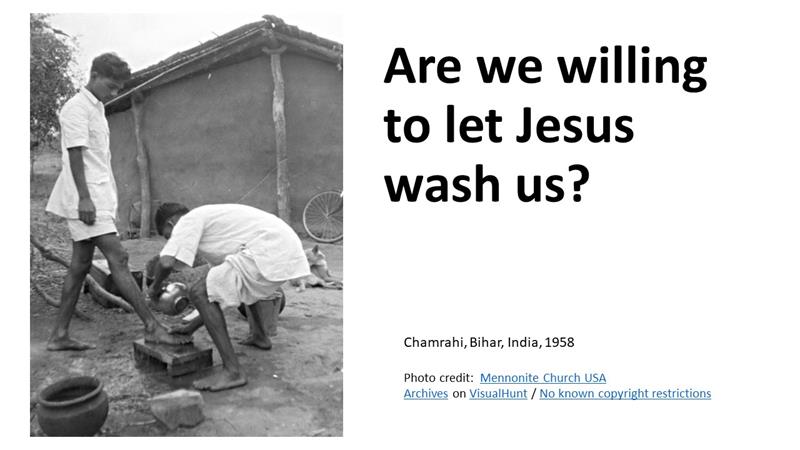
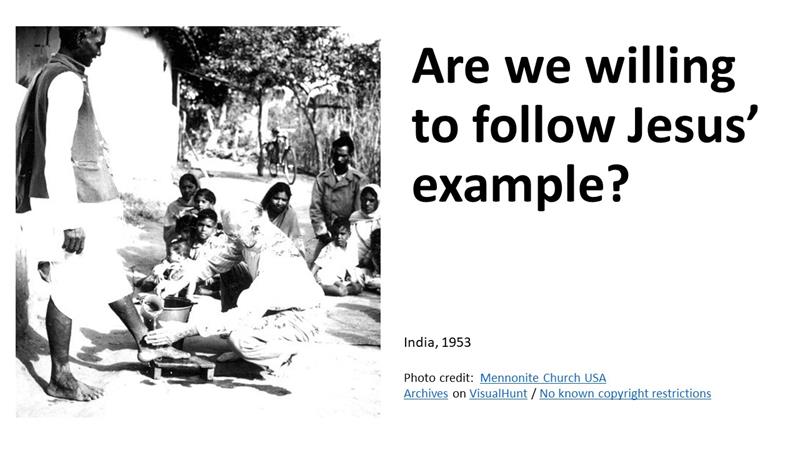 The second implication of the foot washing is ethical. “I’ve done this for you,” Jesus says, “so you need to do it to one another.” Jesus has shown us how to live our lives. We are called to live in mutual service, showing submission to one another, being willing to forgive when we are wronged, and having patience. All these traits, Jesus demonstrated. We too must learn from the Master. We must be willing to follow his example.
The second implication of the foot washing is ethical. “I’ve done this for you,” Jesus says, “so you need to do it to one another.” Jesus has shown us how to live our lives. We are called to live in mutual service, showing submission to one another, being willing to forgive when we are wronged, and having patience. All these traits, Jesus demonstrated. We too must learn from the Master. We must be willing to follow his example.
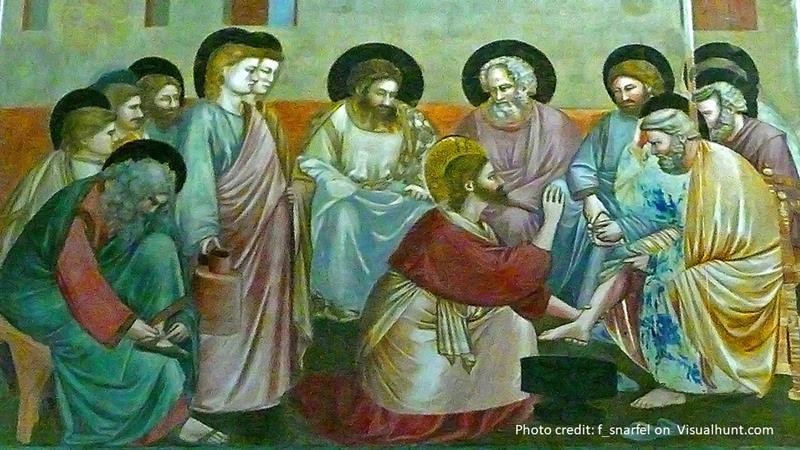 Jesus comes before us at the table, with a towel wrapped around his waist and a basin. He kneels. Do we let him wash our feet? And, if so, are we willing to humble ourselves and serve others in the manner that he has served us? These are questions we need to ask ourselves. Amen.
Jesus comes before us at the table, with a towel wrapped around his waist and a basin. He kneels. Do we let him wash our feet? And, if so, are we willing to humble ourselves and serve others in the manner that he has served us? These are questions we need to ask ourselves. Amen. S. C. Gwynne, Rebel Yell: The Violence, Passion, and Redemption of Stonewall Jackson (New York: Scribner, 2014), 672 pages including appendix, notes, bibliography, maps. There are eight pages of black and white photos.
S. C. Gwynne, Rebel Yell: The Violence, Passion, and Redemption of Stonewall Jackson (New York: Scribner, 2014), 672 pages including appendix, notes, bibliography, maps. There are eight pages of black and white photos.
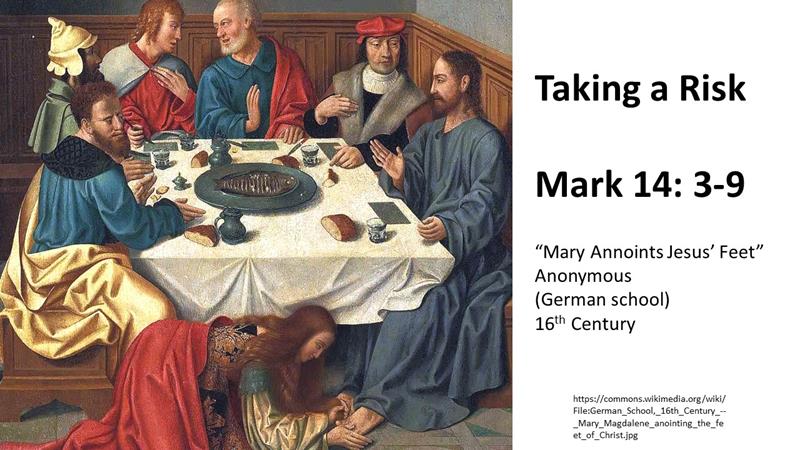 Jeff Garrison
Jeff Garrison 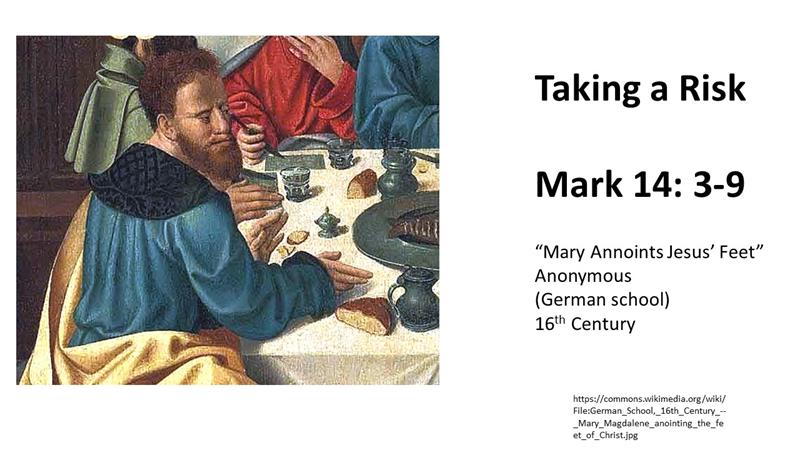 None of us are happy with the way things are going in Jerusalem. It’s not just the political oppression. We’re troubled by the dire situation of the hungry, the poor, the sick, and the disturbed. The Roman’s don’t’ care about them? At least we try. Every penny we scrape up we try to pass on to those who need it. Before Jesus arrived for dinner, some of us were also wondering if we should save some money in case we needed to hide out in the not-too-distant future.
None of us are happy with the way things are going in Jerusalem. It’s not just the political oppression. We’re troubled by the dire situation of the hungry, the poor, the sick, and the disturbed. The Roman’s don’t’ care about them? At least we try. Every penny we scrape up we try to pass on to those who need it. Before Jesus arrived for dinner, some of us were also wondering if we should save some money in case we needed to hide out in the not-too-distant future.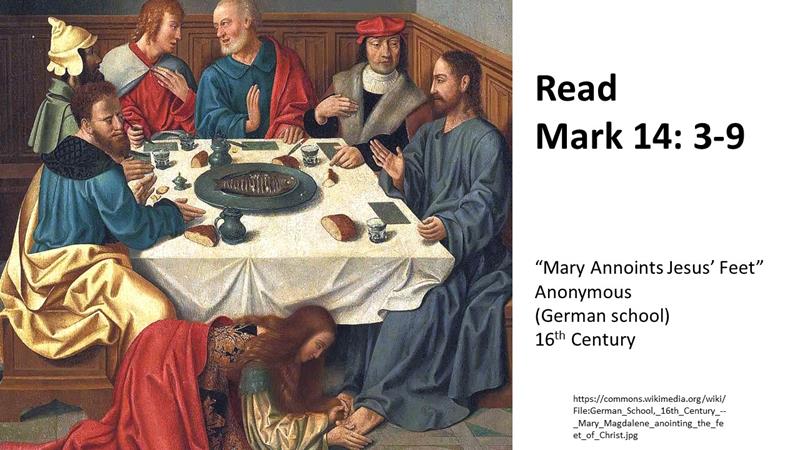
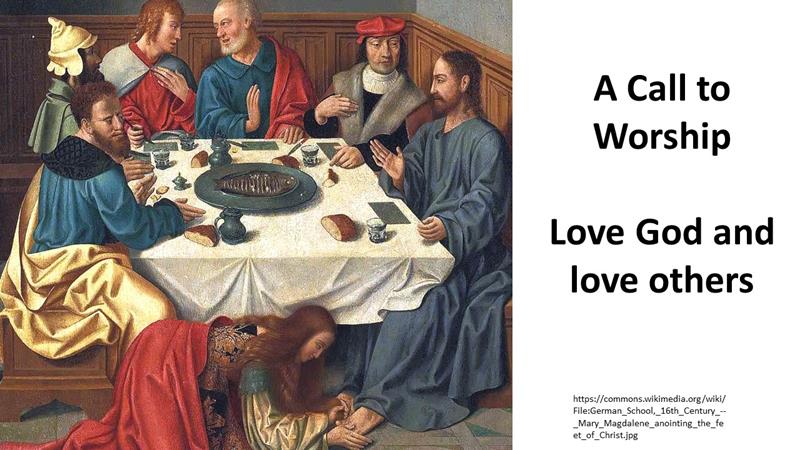 There are two big meals highlighted in the final week of Jesus’ earthly ministry.
There are two big meals highlighted in the final week of Jesus’ earthly ministry.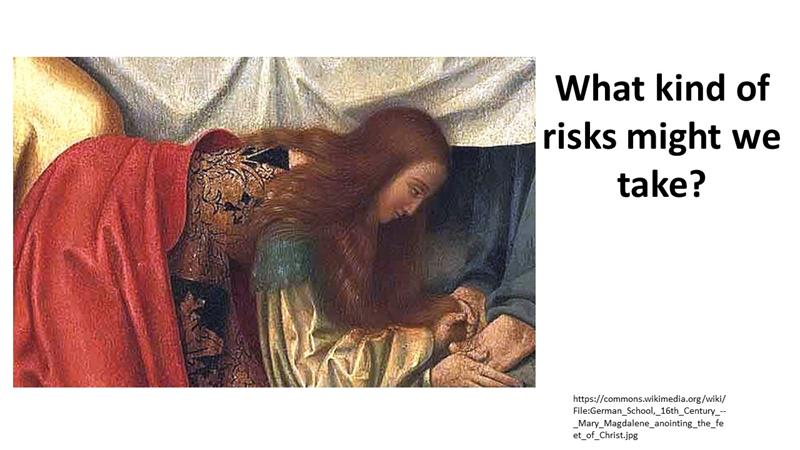
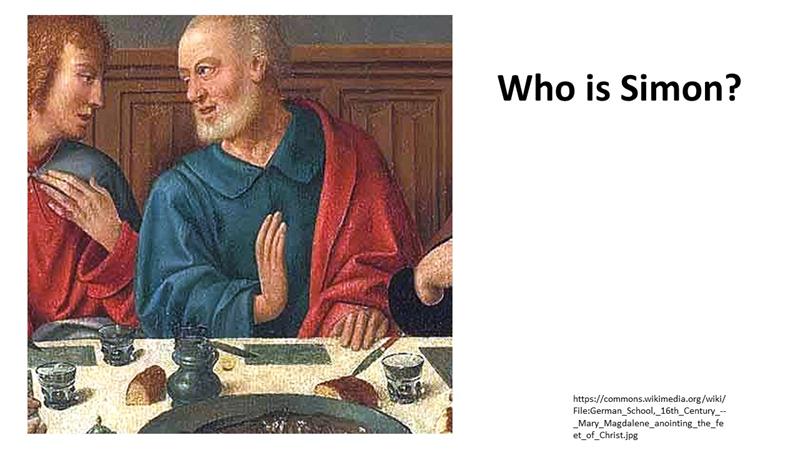
 Now consider the risks this woman takes. She shows up uninvited. She shocks the guests with her generosity. Ever give a gift and wonder and worry if it would be accepted? Her gift does upset those around the table. Why isn’t this money being given to the poor? They ask. Jesus’ protects her dignity, saying she’ll be remembered because of what she’s done. And Jesus doesn’t stop there. He goes on to say we’ll always have the poor, but he won’t be around long, at least not in person.
Now consider the risks this woman takes. She shows up uninvited. She shocks the guests with her generosity. Ever give a gift and wonder and worry if it would be accepted? Her gift does upset those around the table. Why isn’t this money being given to the poor? They ask. Jesus’ protects her dignity, saying she’ll be remembered because of what she’s done. And Jesus doesn’t stop there. He goes on to say we’ll always have the poor, but he won’t be around long, at least not in person.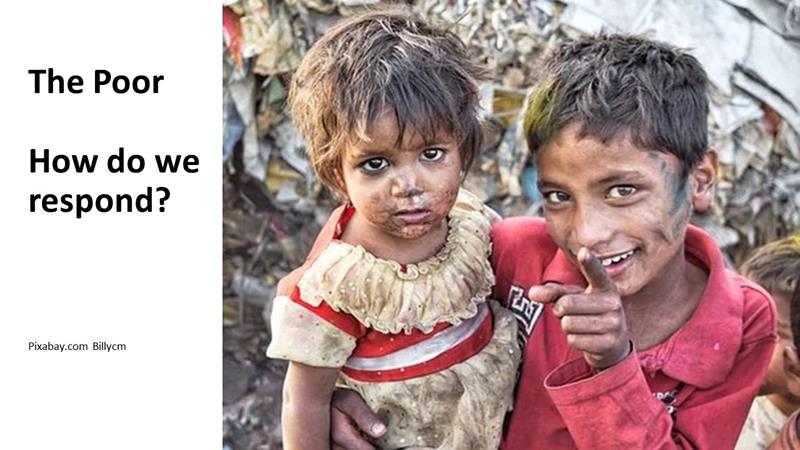 In Matthew’s gospel, we’re told that helping the poor and needy, the sick and the prisoner, is the same as helping Christ,
In Matthew’s gospel, we’re told that helping the poor and needy, the sick and the prisoner, is the same as helping Christ,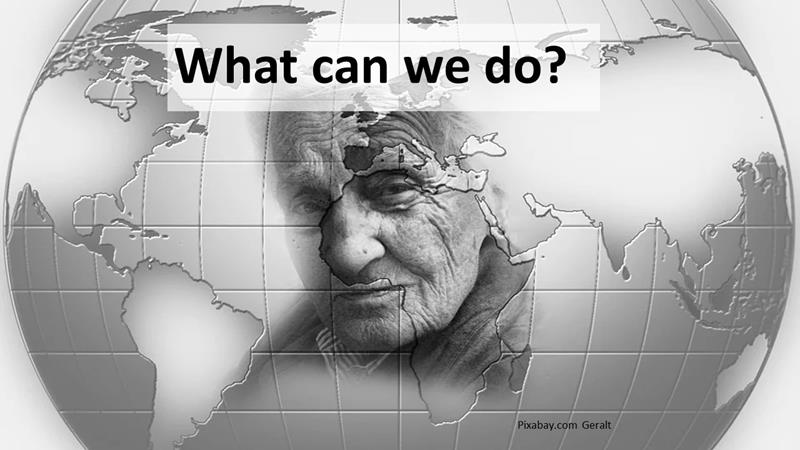 What can we do? We certainly can’t heal the world, just as the woman couldn’t keep Jesus off the cross. But what kind of risk might we take for Jesus? Things are changing so rapidly around us. It’s scary. But we need to remember, this is not the first time Christ’s church has witnessed pestilence. In the 14th Century, a large percentage of the population died from the plague, but at the same time Great Cathedrals were being built.
What can we do? We certainly can’t heal the world, just as the woman couldn’t keep Jesus off the cross. But what kind of risk might we take for Jesus? Things are changing so rapidly around us. It’s scary. But we need to remember, this is not the first time Christ’s church has witnessed pestilence. In the 14th Century, a large percentage of the population died from the plague, but at the same time Great Cathedrals were being built. This woman might be seen as a fool for Christ. She faced ridicule, but Jesus protected her dignity and honored her. Don’t be afraid to be a fool for Christ. For our Master will take care of us. Amen.
This woman might be seen as a fool for Christ. She faced ridicule, but Jesus protected her dignity and honored her. Don’t be afraid to be a fool for Christ. For our Master will take care of us. Amen.
 If you read the entirety of Matthew 22 (and with the extra time we may be having on hand as everything is being cancelled because of the Coronavirus, it’s not a bad idea), you’d witness a masterful campaign to trap Jesus. But Jesus isn’t so easy to catch. He’s kind of like Stonewall Jackson in the Valley Campaign in the spring of 1862. Jackson faced much larger armies who wanted to trap and do him in.
If you read the entirety of Matthew 22 (and with the extra time we may be having on hand as everything is being cancelled because of the Coronavirus, it’s not a bad idea), you’d witness a masterful campaign to trap Jesus. But Jesus isn’t so easy to catch. He’s kind of like Stonewall Jackson in the Valley Campaign in the spring of 1862. Jackson faced much larger armies who wanted to trap and do him in. What’s happened is that unlikely groups join together to challenge Jesus. The old cliché, “politics make strange bedfellows,” rings true. Groups who wouldn’t normally give each other the time of day have come together to take on Jesus. They sense that Jesus is challenging the existing order. You have a few Herodians, who are Jews who believe they’re be better off cooperating with the Romans. They take their name from Herod, who had Jewish blood but worked for the Empire. And you have the Pharisees; a group of seriously committed religious leaders who believe in the resurrection. Theologically, they’re most like Jesus, but Jesus constantly challenges them and exposes their hypocrisy.
What’s happened is that unlikely groups join together to challenge Jesus. The old cliché, “politics make strange bedfellows,” rings true. Groups who wouldn’t normally give each other the time of day have come together to take on Jesus. They sense that Jesus is challenging the existing order. You have a few Herodians, who are Jews who believe they’re be better off cooperating with the Romans. They take their name from Herod, who had Jewish blood but worked for the Empire. And you have the Pharisees; a group of seriously committed religious leaders who believe in the resurrection. Theologically, they’re most like Jesus, but Jesus constantly challenges them and exposes their hypocrisy. What we read this morning could be described as one movement in a tag-team wrestling match. The Herodians and the Pharisees team up on Jesus.
What we read this morning could be described as one movement in a tag-team wrestling match. The Herodians and the Pharisees team up on Jesus. So what is Jesus telling us in this passage? Do you remember those big posters that use to sit out in front of the Post Office and government buildings with Uncle Sam pointing his finger and saying: “I want you!” I believe we could easily surmise this text into a big poster of God saying: “I want you!”
So what is Jesus telling us in this passage? Do you remember those big posters that use to sit out in front of the Post Office and government buildings with Uncle Sam pointing his finger and saying: “I want you!” I believe we could easily surmise this text into a big poster of God saying: “I want you!” “Tell me,” they ask, “Is it lawful to pay taxes to the emperor, or not?” Jesus has to be careful. Last week you heard Deanie preach about the revolutionary act of Jesus cleaning the temple. Now they want Jesus to make a revolutionary statement against the civil authorities. If Jesus says they should not pay taxes, the Herodians could have him arrested for treason. But then, if he says to pay the taxes, the Pharisees can attack him for not being a patriotic Jew.
“Tell me,” they ask, “Is it lawful to pay taxes to the emperor, or not?” Jesus has to be careful. Last week you heard Deanie preach about the revolutionary act of Jesus cleaning the temple. Now they want Jesus to make a revolutionary statement against the civil authorities. If Jesus says they should not pay taxes, the Herodians could have him arrested for treason. But then, if he says to pay the taxes, the Pharisees can attack him for not being a patriotic Jew. Jesus asks them for a coin. Unlike us, he didn’t have to worry about where that’s coin has been or picking up some a virus from its surface. However, Jesus still has to be careful. The disciples, we know, had a common purse and he could have gone there to fetch a coin, but then the Pharisees might have charged him with toting around an engraved image of the emperor.
Jesus asks them for a coin. Unlike us, he didn’t have to worry about where that’s coin has been or picking up some a virus from its surface. However, Jesus still has to be careful. The disciples, we know, had a common purse and he could have gone there to fetch a coin, but then the Pharisees might have charged him with toting around an engraved image of the emperor. Give to God what is God’s. This phrase is often overlooked. We tend to get hung up on what is Caesar’s and what is ours. We get hung up on the petty details and we miss the important question. What does it mean for us to give ourselves to God?
Give to God what is God’s. This phrase is often overlooked. We tend to get hung up on what is Caesar’s and what is ours. We get hung up on the petty details and we miss the important question. What does it mean for us to give ourselves to God? Earlier I mentioned Stonewall Jackson, whose biography I’m currently reading. But let me tell you two other Civil War stories, they’re both short, and demonstrate this point. At the Battle of Shiloh in the spring of 1862, Albert Sidney Johnson led the Confederate troops as they overwhelmed the Union forces near Pittsburg Landing along the Tennessee River. It was a bloody day and the Union lines were broken in places. During a lull in the first day of battle, Johnson, seeing a number of wounded Union soldiers in need, ordered his surgeon to set up an aid station and to tend to their needs. According to Shelby Foote in his novel about the battle, his surgeon, Dr. Yandell protested. Johnson cut him off saying “These men were our enemies a moment ago. They are our prisoners now. Take care of them.” A few minutes later, a stray bullet struck Johnson’s leg and without medical aid, he quickly bled to death.
Earlier I mentioned Stonewall Jackson, whose biography I’m currently reading. But let me tell you two other Civil War stories, they’re both short, and demonstrate this point. At the Battle of Shiloh in the spring of 1862, Albert Sidney Johnson led the Confederate troops as they overwhelmed the Union forces near Pittsburg Landing along the Tennessee River. It was a bloody day and the Union lines were broken in places. During a lull in the first day of battle, Johnson, seeing a number of wounded Union soldiers in need, ordered his surgeon to set up an aid station and to tend to their needs. According to Shelby Foote in his novel about the battle, his surgeon, Dr. Yandell protested. Johnson cut him off saying “These men were our enemies a moment ago. They are our prisoners now. Take care of them.” A few minutes later, a stray bullet struck Johnson’s leg and without medical aid, he quickly bled to death. A second story comes from the city of Wilmington during the Civil War. In 1862, a blockade runner that had come in from the Caribbean brought Yellow Fever to the town. Those who could fled to the country, but several of the pastors and the leading citizens of the town stayed behind, feeling it was their Christian obligation to help out the victims. Over 400 people died of Yellow Fever that fall, including many of those who intentionally stayed to care for the dying.
A second story comes from the city of Wilmington during the Civil War. In 1862, a blockade runner that had come in from the Caribbean brought Yellow Fever to the town. Those who could fled to the country, but several of the pastors and the leading citizens of the town stayed behind, feeling it was their Christian obligation to help out the victims. Over 400 people died of Yellow Fever that fall, including many of those who intentionally stayed to care for the dying. Give to God what is God’s, is the message here. So yes, we should pay our income tax. And when you write that check this April, we might remember that giving Caesar his due can be a lot easier than giving to God what is his. For our whole life belongs to God. But then, God’s given us life and in Jesus Christ has redeemed us to be his people. That’s a debt we can’t repay, nor is such repayment expected. As the old hymn goes, “Jesus paid it all.”
Give to God what is God’s, is the message here. So yes, we should pay our income tax. And when you write that check this April, we might remember that giving Caesar his due can be a lot easier than giving to God what is his. For our whole life belongs to God. But then, God’s given us life and in Jesus Christ has redeemed us to be his people. That’s a debt we can’t repay, nor is such repayment expected. As the old hymn goes, “Jesus paid it all.”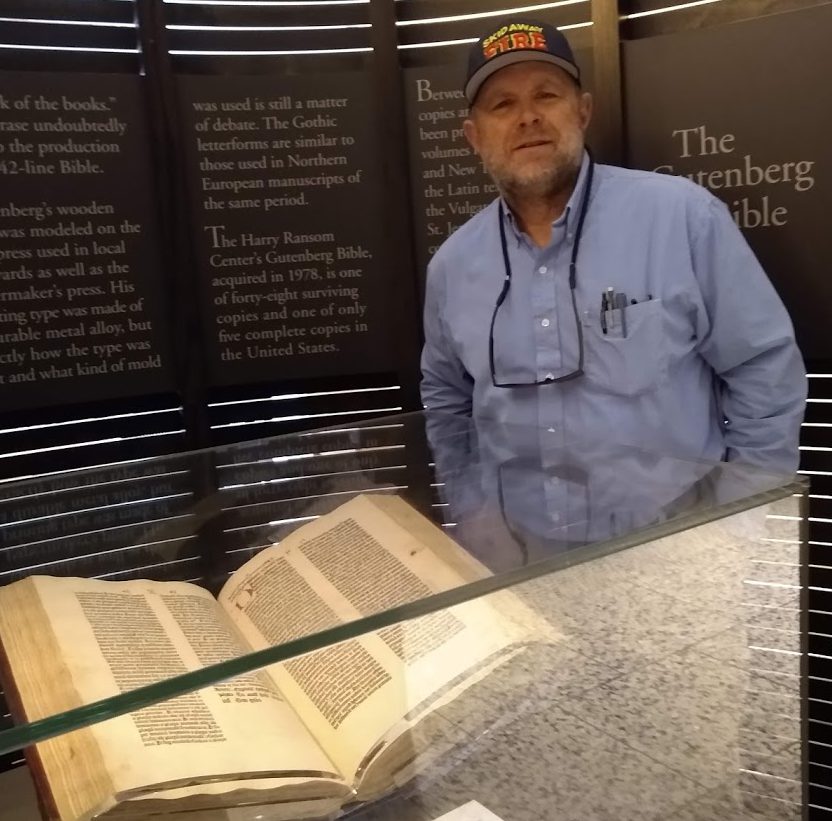

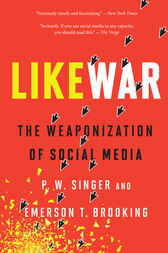 W. Singer and Emerson T. Brooking, LikeWar: The Weaponization of Social Media (2018, Mariner Books, Boston, 2019), 407 pages including index and notes plus eight pages of photos.
W. Singer and Emerson T. Brooking, LikeWar: The Weaponization of Social Media (2018, Mariner Books, Boston, 2019), 407 pages including index and notes plus eight pages of photos.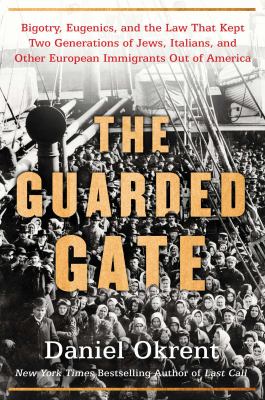
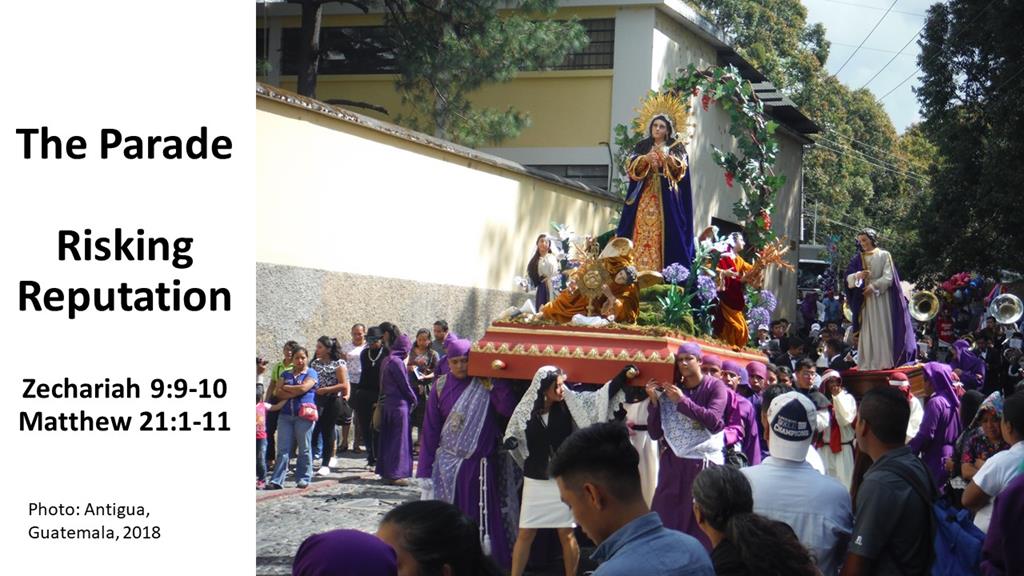 Jeff Garrison
Jeff Garrison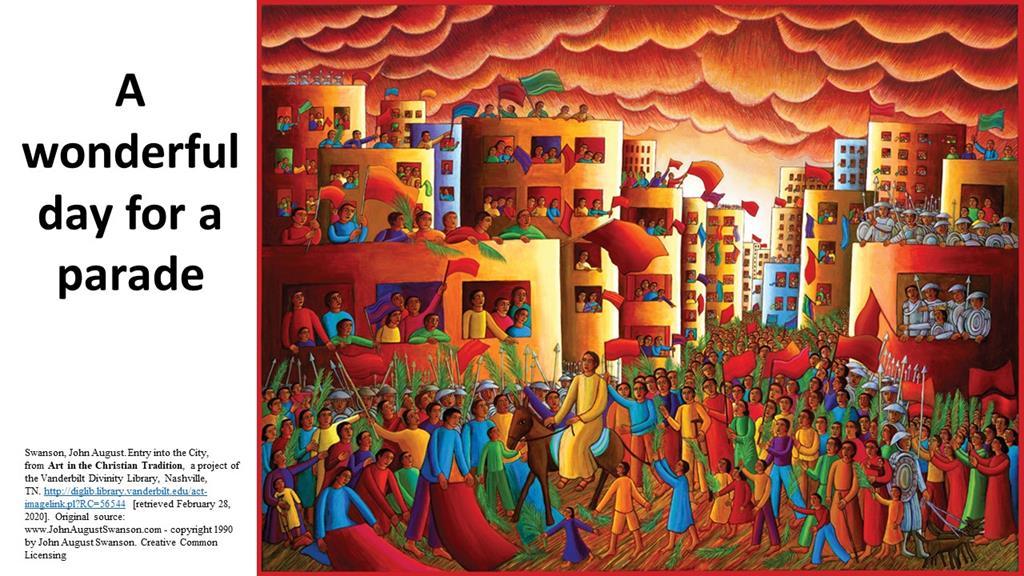
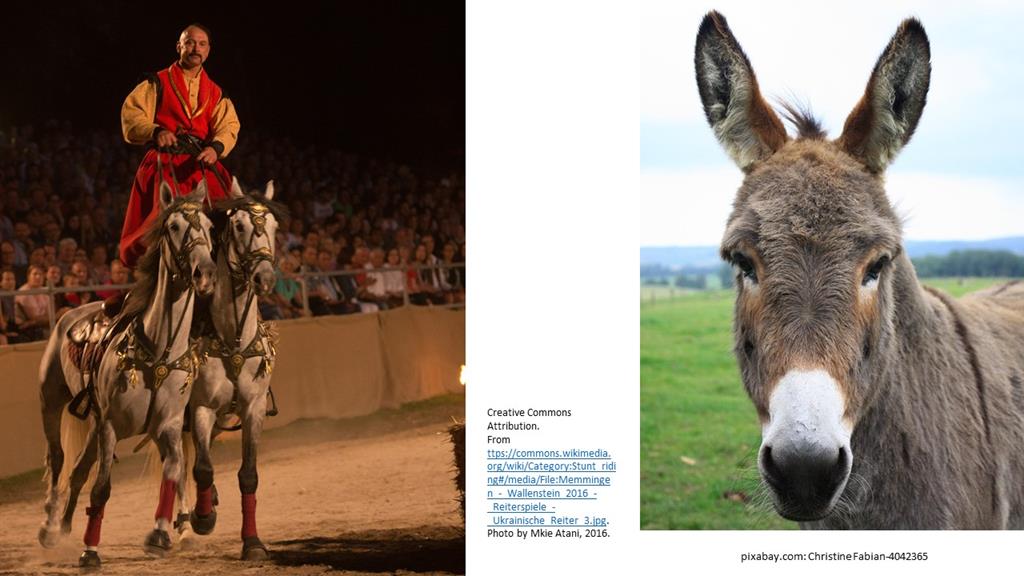 The disciples, without being asked, placed their cloaks on the animals as a saddle. Now, how Jesus rode two animals, as Matthew seems to suggest, we’re not told. We might image him, holding the reigns in his teeth, with a foot on each animal, like a circus rider taking a victory lap, but that’s probably not the case. Instead, he may have sat on the donkey, sidesaddle, as was the custom for riding such beasts, and had the colt follow along, staying close to its mother.
The disciples, without being asked, placed their cloaks on the animals as a saddle. Now, how Jesus rode two animals, as Matthew seems to suggest, we’re not told. We might image him, holding the reigns in his teeth, with a foot on each animal, like a circus rider taking a victory lap, but that’s probably not the case. Instead, he may have sat on the donkey, sidesaddle, as was the custom for riding such beasts, and had the colt follow along, staying close to its mother.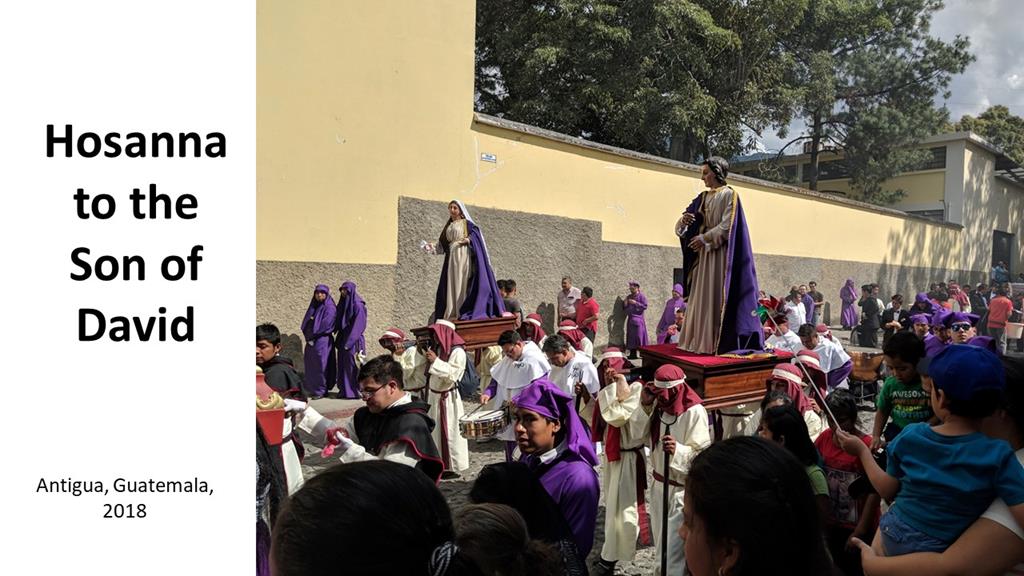 Quickly, as he and the disciples approach the city’s walls, excitement builds. Followers start placing their cloaks on the ground—in Sir Walter Raleigh’s fashion—as the procession begins. Someone brings in branches—we’re not told if they’re palms (the palms only appear in John’s gospel).
Quickly, as he and the disciples approach the city’s walls, excitement builds. Followers start placing their cloaks on the ground—in Sir Walter Raleigh’s fashion—as the procession begins. Someone brings in branches—we’re not told if they’re palms (the palms only appear in John’s gospel).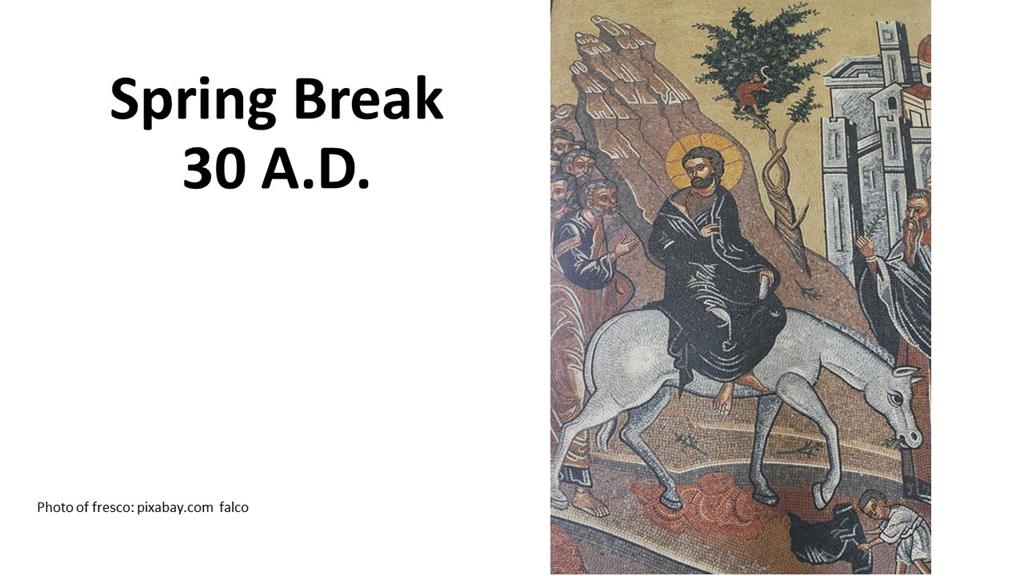 I image its mostly pilgrims making up the crowd. Many of them would have been from the small towns and villages in Galilee, who’ve come to Jerusalem to celebrate the Passover. This is Spring Break, 30 AD. Just like today, most everyone makes a trek south—but instead of Florida, they head to Jerusalem. For many of the pilgrims, this is the highlight of their life—being in Jerusalem for the holiday. It’s like us getting a chance to celebrate New Year’s Eve on Times’ Square, Mardi Gras in New Orleans, or Christmas at Grandma Moses’ farm. This is a once in a lifetime chance. And as they come to Jerusalem, they recall God’s great acts of salvation in the past, of how God freed the Hebrew people from Egyptian slavery and saved them from Pharaoh’s army. Reminiscing about God’s past activity opens them up to the possibility God will act again and restore Israel to her former glory. They’ve gathered in hope.
I image its mostly pilgrims making up the crowd. Many of them would have been from the small towns and villages in Galilee, who’ve come to Jerusalem to celebrate the Passover. This is Spring Break, 30 AD. Just like today, most everyone makes a trek south—but instead of Florida, they head to Jerusalem. For many of the pilgrims, this is the highlight of their life—being in Jerusalem for the holiday. It’s like us getting a chance to celebrate New Year’s Eve on Times’ Square, Mardi Gras in New Orleans, or Christmas at Grandma Moses’ farm. This is a once in a lifetime chance. And as they come to Jerusalem, they recall God’s great acts of salvation in the past, of how God freed the Hebrew people from Egyptian slavery and saved them from Pharaoh’s army. Reminiscing about God’s past activity opens them up to the possibility God will act again and restore Israel to her former glory. They’ve gathered in hope.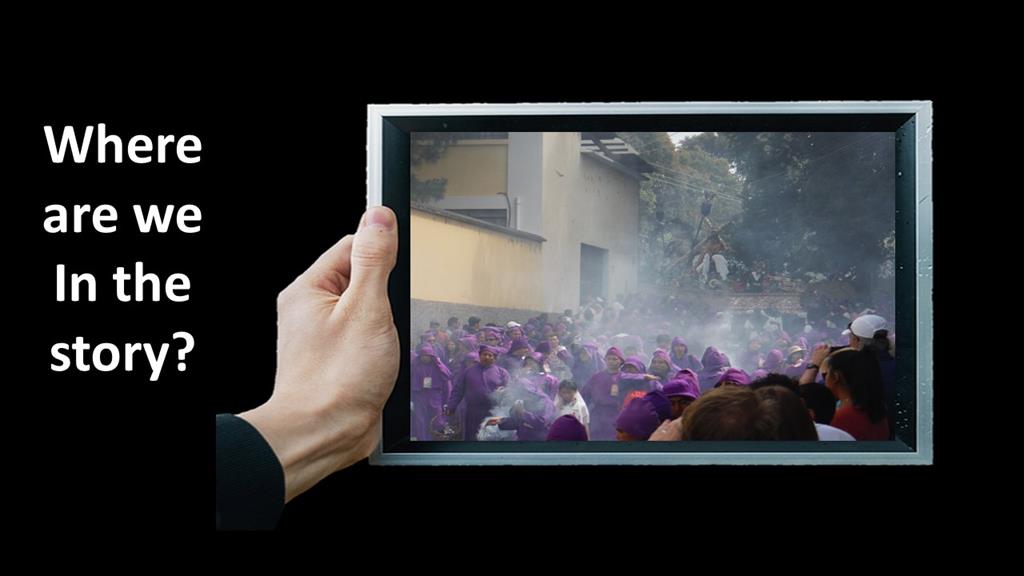 We’re left to wonder what our response would have been if we were there? Where would we be in this story? Would we have been in the crowds shouting “Hosanna?” And if so, would we’ve also been in the crowds shouting “Crucify?” For you see, it’s hard to separate the parade at the beginning of Holy Week, with the crucifixion that comes five days later.
We’re left to wonder what our response would have been if we were there? Where would we be in this story? Would we have been in the crowds shouting “Hosanna?” And if so, would we’ve also been in the crowds shouting “Crucify?” For you see, it’s hard to separate the parade at the beginning of Holy Week, with the crucifixion that comes five days later.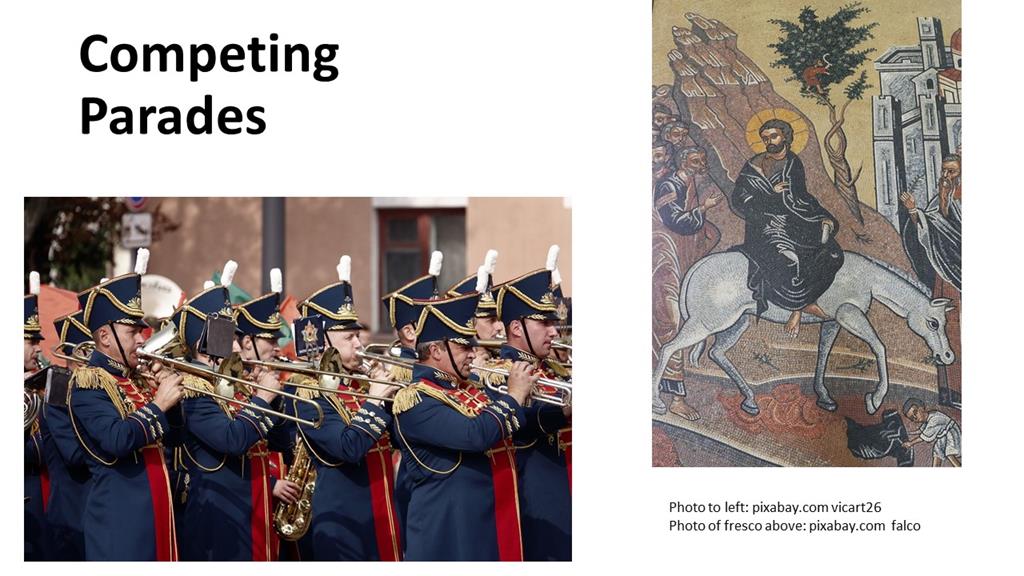 Jesus takes a risk with this parade. In this series we’re going to see repeatedly the risks Jesus and the disciples took during Holy Week. Here, with the parade, Jesus mocks politicians who entered Jerusalem with pomp and circumstance. As Jesus comes into Jerusalem, there were two other significant political figures either already in the city (or if not, they were soon to be there): Pilate, the Roman governor, and Herod, the Roman puppet king. There was probably a parade for them too, one involving fancy horses and soldiers with shiny brass and perhaps even a band. Pilate and Herod display the power of Empire; Jesus, humbly riding on a donkey, displays the power of a mysterious kingdom, one not of this world. Who do we follow? Are we lured by the fancy horses and war chariots of the kings and politicians? Or do we follow the man on a donkey.
Jesus takes a risk with this parade. In this series we’re going to see repeatedly the risks Jesus and the disciples took during Holy Week. Here, with the parade, Jesus mocks politicians who entered Jerusalem with pomp and circumstance. As Jesus comes into Jerusalem, there were two other significant political figures either already in the city (or if not, they were soon to be there): Pilate, the Roman governor, and Herod, the Roman puppet king. There was probably a parade for them too, one involving fancy horses and soldiers with shiny brass and perhaps even a band. Pilate and Herod display the power of Empire; Jesus, humbly riding on a donkey, displays the power of a mysterious kingdom, one not of this world. Who do we follow? Are we lured by the fancy horses and war chariots of the kings and politicians? Or do we follow the man on a donkey.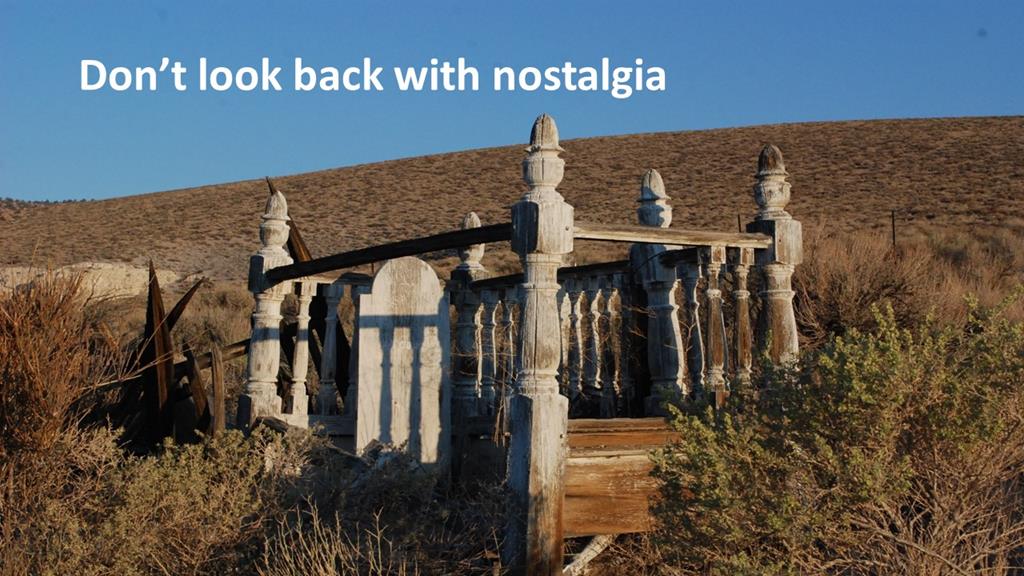
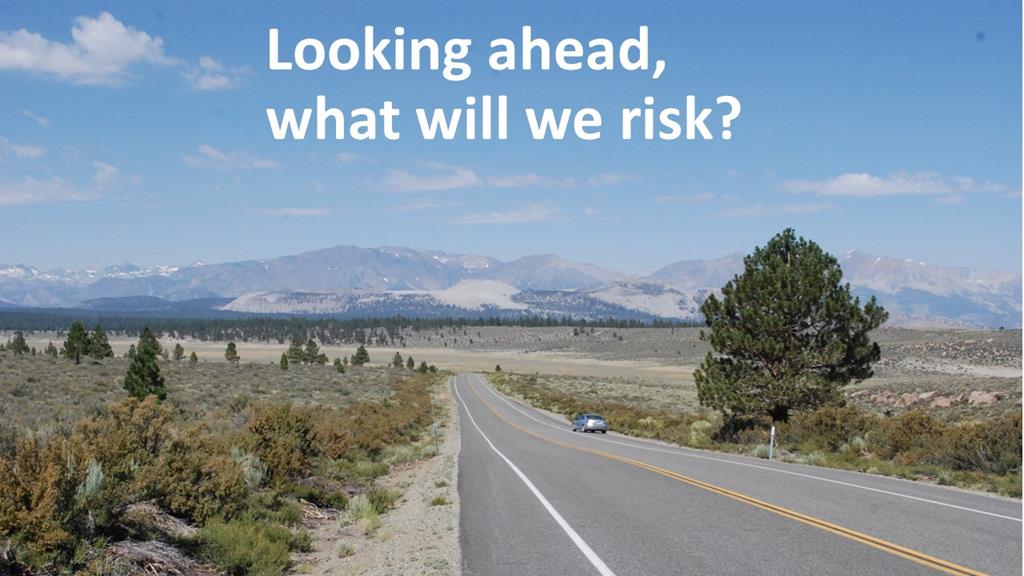 As we move through this season of Lent, we need to ponder what Jesus’ risked during Holy Week, and what we are willing to risk for the sake of the gospel.
As we move through this season of Lent, we need to ponder what Jesus’ risked during Holy Week, and what we are willing to risk for the sake of the gospel.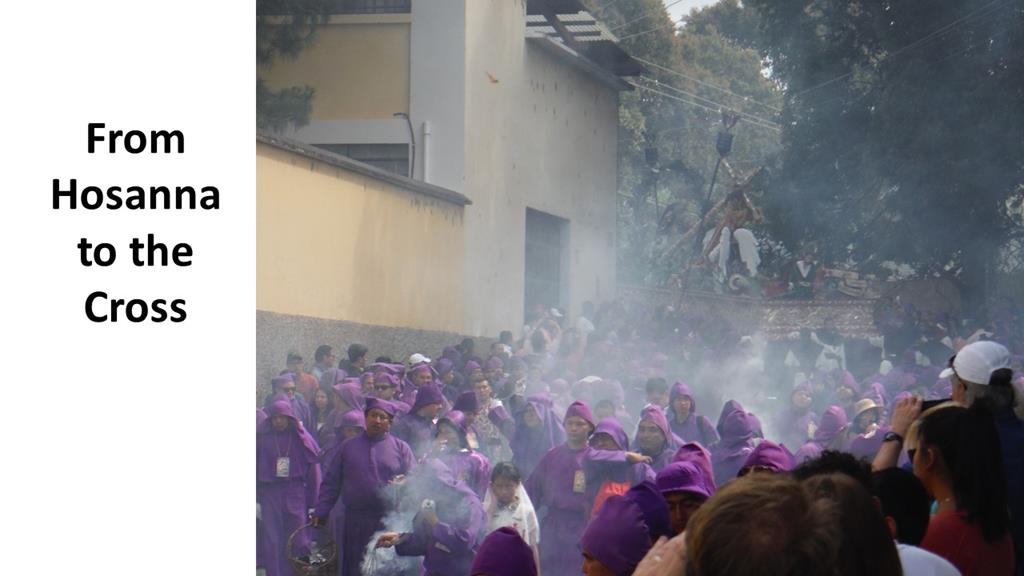 We hear the crowds… We are drawn toward Jesus… Will we just hang around for the fun of the parade, or will we take a risk and continue to follow him as his journey moves toward the cross upon which we’ll be called to sacrifice our wills and desires for his? Amen
We hear the crowds… We are drawn toward Jesus… Will we just hang around for the fun of the parade, or will we take a risk and continue to follow him as his journey moves toward the cross upon which we’ll be called to sacrifice our wills and desires for his? Amen Jeff Garrison
Jeff Garrison

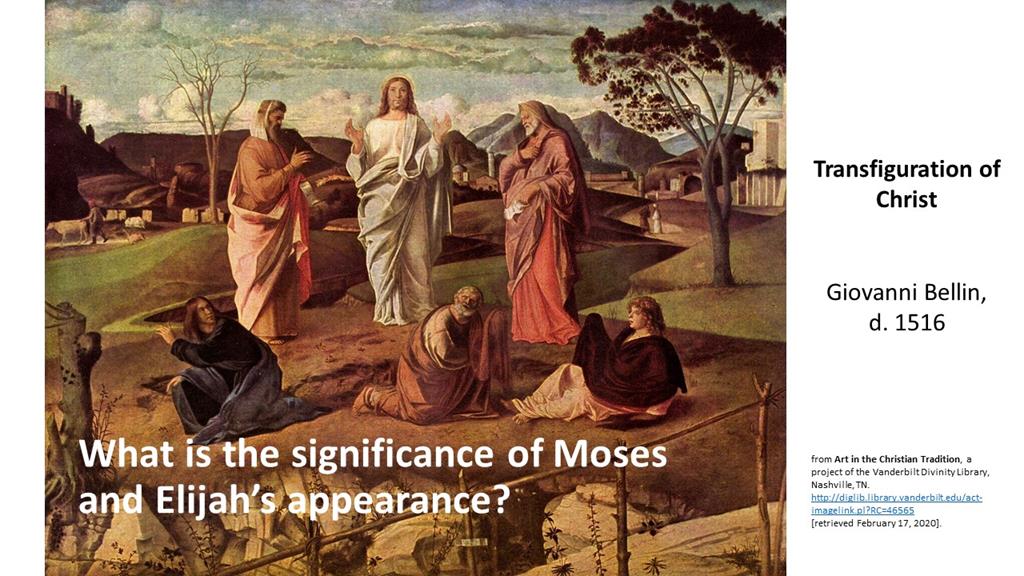
 This all amazes the disciples and causes Peter to begin babble about building shelters, perhaps to prolong the event. But while Peter rambles, we’re told a bright cloud suddenly overshadowed them. Think about this, Jesus is already dazzling white, so this cloud must have been really amazing. And from the cloud, as it was at Jesus’ baptism, God speaks. “This is my Son, the Beloved; with him I am well pleased; listen to him.” The words are the same as at Jesus’ baptism except for the last three: “Listen to him.”
This all amazes the disciples and causes Peter to begin babble about building shelters, perhaps to prolong the event. But while Peter rambles, we’re told a bright cloud suddenly overshadowed them. Think about this, Jesus is already dazzling white, so this cloud must have been really amazing. And from the cloud, as it was at Jesus’ baptism, God speaks. “This is my Son, the Beloved; with him I am well pleased; listen to him.” The words are the same as at Jesus’ baptism except for the last three: “Listen to him.”

 So what does the Transfiguration say to us today? Jesus is Lord, listen to him, obey him, trust him, follow him, and don’t be afraid. “Get up, don’t be afraid.” Good words for us to consider as we, as a congregation, prepare for our future. Amen.
So what does the Transfiguration say to us today? Jesus is Lord, listen to him, obey him, trust him, follow him, and don’t be afraid. “Get up, don’t be afraid.” Good words for us to consider as we, as a congregation, prepare for our future. Amen. Jeff Garrison
Jeff Garrison  Today, we’re looking at walking. In a way, the ability to walk is what makes us human. In Genesis, we have that beautiful image of God walking in the garden and wanting the man and woman to join the stroll.
Today, we’re looking at walking. In a way, the ability to walk is what makes us human. In Genesis, we have that beautiful image of God walking in the garden and wanting the man and woman to join the stroll. Before reading our last passage, from Psalm 119, let me share a bit about this mega-Psalm. You might know that this Psalm is the longest chapter in the Bible. There are 176 verses to the 119th Psalm. It’s way too much to preach on in one sermon! But it’s also a unique. I know you’ve heard me speak of acrostic Psalms… This is a type of poetry where every line begins with the next letter in the alphabet. In English, it would be like writing, “Apples are red, Berries are blue, Cats are cute… etc. Using an acrostic method helps in memorization. I’ll come back to this later in the sermon.
Before reading our last passage, from Psalm 119, let me share a bit about this mega-Psalm. You might know that this Psalm is the longest chapter in the Bible. There are 176 verses to the 119th Psalm. It’s way too much to preach on in one sermon! But it’s also a unique. I know you’ve heard me speak of acrostic Psalms… This is a type of poetry where every line begins with the next letter in the alphabet. In English, it would be like writing, “Apples are red, Berries are blue, Cats are cute… etc. Using an acrostic method helps in memorization. I’ll come back to this later in the sermon.



 Of course, we’re not just to walk for walking sake, even though it is good for our physical being. Scripture tells us repeatedly to walk in the ways of the Lord. Psalm 119 is a meditation on God’s law. Throughout this passage, we’re encouraged to walk in the law, to walk in the ways of God, to let God’s law light the path for our feet.
Of course, we’re not just to walk for walking sake, even though it is good for our physical being. Scripture tells us repeatedly to walk in the ways of the Lord. Psalm 119 is a meditation on God’s law. Throughout this passage, we’re encouraged to walk in the law, to walk in the ways of God, to let God’s law light the path for our feet. But I also want you to join in on another walk, one that will involve all the congregation. As you know, next Sunday we’re going to lay out a new Strategic Plan for our congregation. We want to be a “joyful, thriving church reflecting the face of Jesus to the world!” Our mission is to “Love God, Love our Neighbors, and to Change the world.” We have set up core values (using an acrostic formation-kind of like Psalm 119-that spells out WORSHIP). These core values demonstrate God’s love by Welcoming, Offering, Respecting, Serving, Helping, Investing, and Praying. All this is supported by four pillars, which we as a church need to walk within. These pillars will require each of us to commit ourselves to excellence, and we if bind ourselves on this journey together, we will live into our Vision and Mission.
But I also want you to join in on another walk, one that will involve all the congregation. As you know, next Sunday we’re going to lay out a new Strategic Plan for our congregation. We want to be a “joyful, thriving church reflecting the face of Jesus to the world!” Our mission is to “Love God, Love our Neighbors, and to Change the world.” We have set up core values (using an acrostic formation-kind of like Psalm 119-that spells out WORSHIP). These core values demonstrate God’s love by Welcoming, Offering, Respecting, Serving, Helping, Investing, and Praying. All this is supported by four pillars, which we as a church need to walk within. These pillars will require each of us to commit ourselves to excellence, and we if bind ourselves on this journey together, we will live into our Vision and Mission.